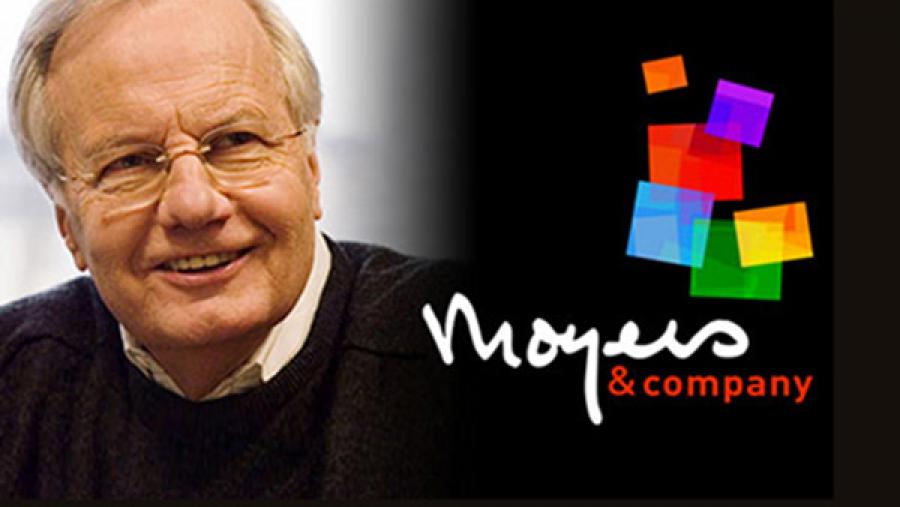Submitted by Mary Bottari on

After more than four decades of producing some of the most hard-hitting news shows and documentaries ever aired on public television, Bill Moyers concluded his last show with a message to a new generation of progressives, "over to you now."
“So as the next generation steps forward, I am tempted to think that the only thing my generation can say to them is: we’re sorry,” Moyers said. “Sorry for the mess you’re inheriting. Sorry we broke the trust. But I know in my heart that’s not what they ask or expect.”
Once a press secretary to former President Johnson, Moyers' 43 year career on public television earned him a spot in the Television Hall of Fame. Unwavering support from his viewers talked him out of a previous plan to retire in 2013, but at 80 years young, Moyers has decided the time is right to move onto other projects. He will keep writing and reporting at BillMoyers.com.
A “Lonely Bugle” on Critical Issues
Over the years, Moyers and his prolific team of writers and reseachers have produced thousands of investigative pieces. His most recent venture, Moyers & Company, produced 100 one-hour new shows featuring some of America's best thinkers. He discussed the perils of the big banks with Elizabeth Warren, increasing inequality with Robert Reich and Paul Krugman; the stranglehold of money on politics with Bernie Sanders; and the devasting impact of climate change with Bill McKibben.
His show was one-of-a-kind, and leaves a huge hole in the American media landscape. Moyers was acutely aware of the collapse of American media as quality news shows dropped off the air and tens of thousands of print reporters los their jobs. He crusaded against media concentration warning that a free and independent media is essential to a functioning democracy.
“Bill Moyers, almost single-handedly, covered the threat of concentrated media ownership and corrupt policymaking when the rest of the news media was sound asleep or parroting elite soundbites. He has done scores of detailed and incisive reports on media ownership issues over the year, and I fear the thought of where we would be today without his without his lonely bugle,” Free Press co-founder Robert McChesney told CMD.
Moyers was also critically important to CMD’s work exposing ALEC. In 2012, his documentary United States of ALEC brought the machination of the corporate bill mill to millions of viewers. The documentary was shown at democracy conferences, legislator meetings, and by hundreds of community groups across the country. "The show's regular reporting on ALEC has helped build momentum behind the efforts of community groups to convince 100 companies to stop funding ALEC's extreme agenda," said CMD's Lisa Graves.
An ordained Baptist preacher, Moyer’s success owes much to his warm personality an "anomaly" on television says the New York Times. “His delivery is measured and the rhetoric temperate. Yet he used the tools of the documentarian to wield a velvet sledgehammer, bludgeoning corporate polluters and government ne'er-do-wells with precision and grace. His tendentiousness in choice of targets has earned him the fealty of public-television audiences and the enmity of conservative observers.”
Jim Hightower said Congress should declare Moyers as “one of America’s most precious natural resources." He has received more than 30 Emmys, two Alfred I. Dupont-Columbia University Awards, nine Peabodys, three George Polk Awards and several other noteworthy awards.
Final Show Highlights the Fight Ahead Over Climate Change
In his last episode that aired on January 1 titled, "The Children’s Climate Crusade," Moyers put the spotlight on the environmental crisis one last time. He interviewed Mary Christina Wood, a legal scholar who wrote the book, Nature’s Trust. Wood argues for a new concept of atmospheric trust litigation rooted in the age-old notion that nature is a public trust. The episode came out just a few weeks after Moyers interviewed 18-year-old Kelsey Juliana, a co-plaintiff in a lawsuit that could force the state of Oregon to take a more aggressive stance against carbon emissions.
“Climate is not just an environmental issue,” Wood said. “This is a civilizational issue. This is the biggest case that courts will get in terms of the potential harm in front of them, the population affected by that harm, and in terms of the urgency. Climate is mind-blowing. It can't be categorized any longer as an environmental issue.”
After his final interview, Moyers only took a few moments to conclude his series, “so to this new generation I say: over to you, welcome to the fight," Moyers said.
Are you ready?

